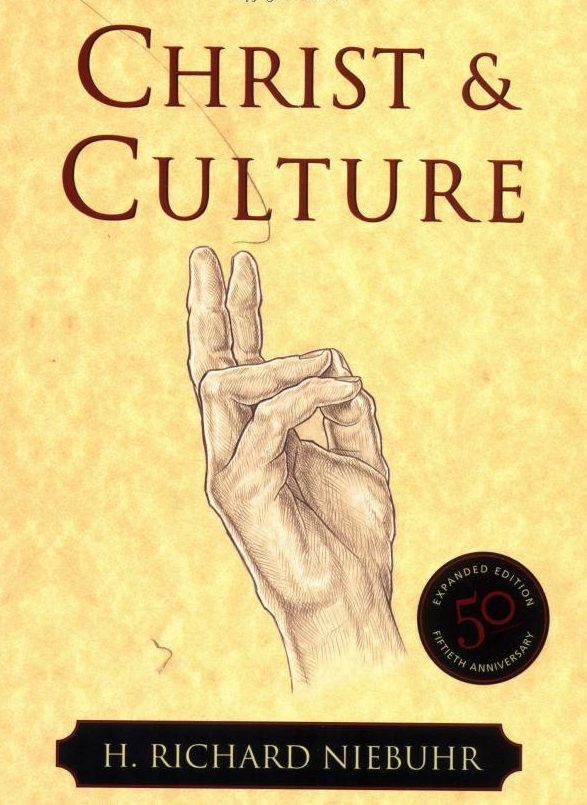 It's almost impossible to engage in a conversation about culture without someone mentioning H. Richard Niehbur's Christ & Culture. I learned about Niehbur through D.A. Carson's Christ & Culture: Revisited (and I regret not reading Niebuhr's book first!)
It's almost impossible to engage in a conversation about culture without someone mentioning H. Richard Niehbur's Christ & Culture. I learned about Niehbur through D.A. Carson's Christ & Culture: Revisited (and I regret not reading Niebuhr's book first!)
H. Richard Niebuhr explained liberal theology in this sentence: "A God without wrath brought men without sin into a kingdom without judgment through the ministrations of a Christ without a cross."
It's amazing how often H. Richard Niebuhr's book, "Christ & Culture", is still discussed today. It was published in 1955, I recently found and read a reprint of Niebuhr's classic that celebrates the book's half-century milestone that includes a foreword by Martin E. Marty, and a preface by James M. Gustafson and a very helpful summary introductory essay by H. Richard Niebuhr.
 Niebuhr's essay gave a great context to the book by listing examples of famous theologians that fit each of his five categories of Christ & Culture. Gustafson's short history book was more nostalgic than clarifying, although it added the minimum details to read the book. Unfortunately, the was not much biographical information on H. Richard Niebuhr in this book, which was disappointing since this is my first engagement with Niebuhr.
Niebuhr's essay gave a great context to the book by listing examples of famous theologians that fit each of his five categories of Christ & Culture. Gustafson's short history book was more nostalgic than clarifying, although it added the minimum details to read the book. Unfortunately, the was not much biographical information on H. Richard Niebuhr in this book, which was disappointing since this is my first engagement with Niebuhr.
All I took away from the prefaces was that Reinhold Niebuhr was Richard's older brother, and that Richard had a son who also published theology books, but I don't know of any of Richard's son's writings, and that Reinhold has produced a large amount of books. However, one anecdote from the introduction was a list of George Marsden quotes that gave a negative evaluation of Niebuhr's classic, which the editor was more offended by than addressed in anyway. (I love Marsden, especially his biography Jonathan Edwards: A Life, and know that he wrote many other church history books, especially on fundamentalism, so I think Marsden's critiques are worth considering.)
I turned to The Google for a Niebuhr biography, and was disappointed by the information on the famous MMORPG commonly known as Wikipedia where I only learned that his first name is Helmut and some history about the United Church of Christ. However, I was able to find H.R. Niebuhr's obituary from the New York Times hosted at his alma-matter, Elmhurst College (Read It Here).
The first thing to know about Christ & Culture, is this book is foremost considered a book on ethics. "Christian Ethics" was not my first thought when I categorized this book, but "ethics" is the first word everyone says when they see me holding this Niebuhr volume. Maybe its because its a seminary class that young minds are first dragged into the mess of Christian Ethics. When I think of Ethics, I think of Jonathan Edward's magisterial Ethical Writings (Yale Volume 8) containing The Nature of True Virtue and The Ends For Which God Created The World, etc. And when I think of Christ & Culture I typically think of Luther's Two Kingdoms or the recent fad topic of Federal Vision and the perennial topic of Church and State.
Neibuhr's Categories
At last, the content review! As you may know already, Christ & Culture consists of five categories of the ways that Christians have historically understood culture in relation to Christianity: Christ Against Culture, Christ of Culture, Christ Above Culture, Christ And Culture In Paradox, Christ Transforming Culture. In short, each of theses views have things to embrace and elements to avoid.
I. Christ Against Culture
Christ Against Culture basically is the view that culture is all bad and needs to be annihilated. The pinnacle example via Niebuhr was Tertullian, and his rejection of culture. Although Tertullian is analyzed in depth, to be frank, this Chapter read like one big rant against Leo Tolstoy. Yes, Tolstoy was an Anabaptist, and Yes, everyone hates Anabaptists. That's what the reformation was actually about -- hating Anabaptists. But, Tolstoy wrote two amazing novels: War and Peace and Anna Karenina. And, not everyone can be a "Dostoevsky" and write a "Brothers Karamazov." Even if Niebuhr is right about Tolstoy, it's still good to separate Tolstoy out from the disaster of the Radical Reformation. Niebuhr makes great analysis of this perspective, and the contradiction of being a literary master and someone who rejects culture.
II. Christ Of Culture
This is the great chapter about John Locke's "The Reasonableness of Christianity, Friedrich Schleiermacher's "The Christian Faith" and the works of Albrecht Ritschl. The irony of this chapter is that it's basically the same as Christ Against Culture but it's arch-enemy. This is where the modern-scientist, like Marcion, comes and rips out the supernatural and unfashionable parts of the New Testament, in the same way as Thomas Jefferson did to his bible.
III. Christ Above Culture
Above, as in Idealism. When I say "idealism", don't think Locke, but rather think Doctor Angelicus Thomas of Aquinas. If Christianity were to perfect culture, no one could do it better than Aquinas.
IV. Christ And Culture In Paradox
Here lies Martin Luther's doctrine of the "Two Kingdoms". R.I.P.
V. Christ Transforming Culture
Augustine of Hippo, and John Calvin too are lumped into this category, and as most of Church History.
Conclusion
This book is a recorded lecture, so it doesn't have the depth as a theology book normally has that was intended primarily for print. However, its still excellent, in the same way as Abraham Kuyper's Lectures on Calvinism were, despite being first lectures and second a theology book.
Related: Al Mohler, Albrecht Ritschl, Augustine, Augustine of Hippo, Christ, Christ and Culture, Culture, ethics, Friedrich Schleiermacher, H. Richard Niebuhr, Helmut Richard Niebuhr, John Calvin, Leo Tolstoy, Niebhur, Paul Tillich, Tertullian, Thomas Jefferson



August 1st, 2022 - 10:35
Cool intro on the book, but the positions could use some synopsis for the reader. 😀